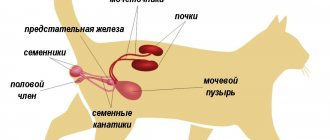Castration of animals requires a fairly strict time frame during which removal of the gonads is most effective and less traumatic. It is a mistake to imagine a pet’s body as a mechanism whose operation can be interfered with at any time. The physiology of cats suggests a fixed age that is best suited for castration. Being late or being too hasty in regards to this operation can lead to dire consequences, so every owner of a furry friend should know the answer to the question at what age cats are neutered.
At what age are cats neutered?
Why do you need to castrate cats?
When choosing between who to take into the house - a “boy” or a “girl”, many prefer male kittens. But by six months the cute kitten begins to show sexual activity. The result affects the furniture, carpets, and shoes of the owners. A cat living at home instinctively leaves odorous marks that cannot be eliminated.
Often, a cat’s natural instincts lead to tragedy. An animal can jump out of a window or from a balcony, or slip out of a slightly open door. If a cat has never been outside, he will not be able to withstand a fight with tailed street fighters. And the cat is unlikely to find his way home. Another "lost" one. Even if the cat was found and returned home, it is not a fact that he did not manage to become infected with the infection from street animals.
The other “side of the coin”: castration will help reduce the population of animals born on the streets. If a cat is free-range, he will definitely find a “girlfriend”. Weak and non-viable kittens are doomed to death or even more sickly offspring.
Castration of a cat changes not only its sexual habits, but also its character. The animal stops marking its territory and calmly treats the females living in the house. Owners note the gentler and calmer disposition of a neutered cat - he does not show aggression towards people or “rivals”.
Early and late castration
Veterinarians usually recommend castrating kittens at the age of no earlier than 7-8 months, when the body is almost physiologically formed. If the owners have enough patience, it is not harmful to wait until a year, when all the body systems have finally matured. However, sometimes you can find information that early castration of cats does not harm the body. Let's figure out what's what.
Early castration - rush for no reason
Castration of kittens aged 2 to 5 months has become common in our country not so long ago. And many baby owners are very happy with this opportunity: they will never have to find out what cat marks smell like, because the operation is done at too early an age.
The opinions of experts differ diametrically. Some argue that there is no danger either during surgery or in the future. Others say that kittens need time to grow and mature.
The arguments of supporters of early castration are as follows:
• When the testes are removed up to 4-5 months, no narrowing of the urethra is observed. And this has long been considered the main reason for refusing early castration. Research has shown the opposite.
• For a long time it was believed that early castrati become underdeveloped and have problems with the musculoskeletal system. Studies have shown that early castrati often become larger than their peers.
Opponents of early castration argue the harm from the operation as follows:
• A tiny kitten weighs so little that it is extremely difficult to calculate the dose of anesthesia that is necessary and safe for it, and an “overdose” is fraught with the death of the animal or complications upon exit. In general, general anesthesia is given to kittens only in extreme cases - if there is a threat to life.
• There are no convincing scientific studies with statistical data on the effect of early neutering on the behavior of such young kittens. It is impossible to predict how castration will affect the psyche of a particular kitten. However, some lethargy is often observed after a year of life, especially if the pet has never been outside.
• Early neutered kittens become taller than their peers. But there is nothing to rejoice about here, since it is known that early castration slows down the formation of the skeleton. When in uncastrated individuals the skeleton is already fully formed, in early castrates it is still growing, elongating in length. But bone material in the body is not added with castration; there will be as much of it as is genetically determined. The skeleton stretches and thins, becoming more fragile. Loose bone tissue is more susceptible to fractures and other injuries.
• Many kittens are born cryptorchid, their testicles are not descended into the scrotum and are located in the abdominal cavity (this deviation often goes away with age). Early castration of cryptorchids is an abdominal operation with opening of the abdominal cavity; needless to say, this is more complicated, and the postoperative period will become longer and more difficult.
• Children's immunity is still weak, and besides, early age is the time for vaccinations. At this time, surgery is an extra burden on the immune system.
• A direct connection between early castration and the subsequent development of urolithiasis has not been identified. But the studies lasted a maximum of 3 years, while urolithiasis manifests itself at 7-8 years, so such observations are insufficient. At the same time, it is reliably known that after castration the animal becomes lethargic and prone to obesity, and these are the main predisposing factors.
Late castration and age-related problems
If the cat is already elderly, then veterinarians, as a rule, do not recommend “disturbing” his worn-out body by castration. In old age, castration is usually carried out for medical reasons - uncontrolled aggression, urinary incontinence, prostate hyperplasia, testicular cancer.
Important! Old cats are rarely completely healthy. Stress associated with the operation, general anesthesia, stress on the body due to hormonal changes - all this can aggravate existing chronic diseases.
Renal and heart failure are contraindications for surgery. Due to a drop in blood pressure, the kidneys may not be able to do their job. Anesthesia slows down the work of the heart, so if there is insufficiency, acute cardiovascular failure can occur.
Even if the operation was successful, in the future the old cat and its owner may encounter the following complications:
• An elderly body does not heal its wounds well. Long healing of wounds increases the risk of infection and inflammation, bleeding, and suture dehiscence.
• The likelihood of urethral blockage and the development of urolithiasis may increase.
• A common complication after castration of older cats is constipation, as anesthesia relaxes the smooth muscles of the intestines, and recovery is slow due to age.
• There is a risk of developing hernias, since old tissues are flabby and prone to cellular proliferation and loss.
We should not forget that purebred cats often have a predisposition to certain diseases that pose a danger in case of castration. Thus, Persians, Siamese, and Maine Coons are prone to diseases of the cardiovascular system (including hypertrophic and dilated cardiomyopathy in middle and old age). Himalayans, Persians, and shorthaired exotics often suffer from polycystic kidney disease.
The general immunity of pedigree cats is reduced. Therefore, it is necessary to know what specific diseases your elderly “aristocrat” is prone to. But for everyone - both for the breed and for the domestic “old men” - one thing is true: before castration, every “honored veteran” must undergo a comprehensive medical examination and pass all possible tests!
How is castration performed?
Any operation has positive and negative consequences. After castration, the cat will become more obedient and calm. Neutered cats live longer. However, owners will have to carefully monitor the cat's diet and maintain the health of the urinary system.
Positive aspects of castration:
- aggression and nervousness are reduced;
- the risk of injury and escaping from home is reduced;
- the cat stops marking its territory.
The negative aspects of the operation include:
- risk of obesity and development of urolithiasis;
- risk (minimal) of complications after surgery;
- allergy to anesthesia (and the danger of its effects on weakened animals, cats suffering from cardiovascular diseases).
From 2-5 years
It happens that a cat ends up with its owners as an adult. If there are no contraindications, cats can be neutered at this age. You shouldn't expect much effect from the manipulation. The cat's body developed under the influence of sex hormones.
Castration of an adult pet will not solve problems with marking the premises with urine, attempts to escape from the house and regular howling. Unfortunately, it is almost impossible to correct the habits and behavior of an older cat.
The disadvantages outweigh the benefits of the intervention
- Risk of physical inactivity.
- Gaining excess weight. Corrected by a specially selected diet
The operation is performed only under general anesthesia.
At what age is it better to castrate a cat?
Veterinarians recommend castration of kittens at the age of 6-9 months. By this age, the animal has already formed, and the removal of the genital organs - the testes - will not affect the hormonal background of the body.
If the operation is performed on an adult animal, the animal’s sexual habits are often preserved - it can still mark its territory and fight with “rivals.” Sometimes castration is prescribed for adult animals and even elderly animals with certain diseases of the genitourinary system.
Determining whether a cat is ready for castration
How to determine the age for castration of a cat? According to doctors, the procedure should be performed upon reaching puberty or full anatomical maturity. This period is different for different breeds.
There are no clearly defined limits on how long cats can be castrated.
The animal is ready for castration if several conditions are met:
- Puberty has recently begun. The influence of sex hormones on the development of an animal’s body is not so great.
- Organs and systems have finally formed. Castration slows down metabolic processes.
- The testes have descended from the abdominal cavity or inguinal ring. The owner can gently feel the cat's testicles. They should descend into the scrotum.
- Optimal age for castration
The most favorable age for castration of a cat is 7 to 9 months.
Causes:
- The kitten has gained enough weight
- The animal's body is formed, but puberty is not over. Hormones are produced so far only in the testes.
After 12 months, sex hormones begin to be produced by the adrenal glands and pituitary gland. It will be more difficult to correct sexual behavior.
It is better to castrate a cat that did not take part in mating. Otherwise, the desire for sexual intercourse may persist.
Types of castration
There are different surgical and chemical methods of castration of cats. The most popular and safest is surgery. Castration of a cat will prevent uncontrolled reproduction and uncontrollable behavior of the animal.
Surgical methods include:
- sterilization (palliative method consisting in ligation of the spermatic cords);
- Castration is a radical method in which the gonads are completely removed.
In the first case, the cat’s sexual desire does not decrease, sexual functions are not impaired, which does not cause changes in the animal’s behavior. The cat will mark its territory and scream to attract females. The character of the cat does not change either - he will defend his “male rights” to the bitter end. It is because of this that this method is unpopular.
A radical method is to remove the testes. It is carried out in two ways - open or closed. How is castration of cats carried out ?
- With the open method, the cat is given general anesthesia, the doctor cuts the skin of the scrotum and opens the membrane of the testicle. The testis is removed, the vessels are tied into a knot. There are no stitches.
- With the closed method, the tunica vaginalis of the testicle is not opened, and the testis along with it is removed from the scrotum. The whole operation takes no more than 5 minutes.
Chemical castration of a cat is a method of radiation exposure to the genitals of an animal. It has not yet become widespread, but specialists at the Lucky veterinary clinic in St. Petersburg recommend it as a safe, painless and reliable method.
Caring for an animal after castration
A cat is castrated fairly quickly, and in most cases this procedure is successful. Now the main thing is to properly care for the animal to eliminate the risks of complications.
After anesthesia, the animal is in a sleeping state, but its eyes remain open. This leads to dryness of the mucous membranes, which can provoke conjunctivitis. To avoid this, it is necessary to moisturize the cat's eyelids by rinsing with a cotton swab and a special solution.
Before castrating your pet, the doctor takes a body temperature measurement. The optimal indicator is 37.5 – 39.0 degrees. After anesthesia, the temperature will drop by several parameters, this is not scary, but for safety reasons it is recommended to wrap the animal and put it in a warm place.
Postoperative period
Usually the animal quickly recovers from anesthesia, and the postoperative period passes without complications. During the first 24 hours, you should look after your pet and limit its mobility. The first hours after waking up the cat will stagger. After 3-4 hours you can give him water. Do not allow the operation site to be licked; monitor the hygiene of the tray. It is better not to use the filler for a few days.
After the operation, the wound will cause discomfort to your pet for several days. It may itch, then the cat will try to lick it. It is recommended to treat the wound with an antiseptic and put a protective collar on the cat.
You can feed the cat only the next day after surgery. The diet will have to be reconsidered - castrated cats are at risk of developing urolithiasis and kidney problems.
Some owners ask the veterinarian why the cat loses weight after castration . Short-term weight loss is the norm; after suffering stress, the body needs some time to recover. With the right food and proper nutrition management, appetite will return and metabolism will normalize.
If after a few weeks the weight has not returned to normal, you should contact a veterinarian. Reasons for losing weight may be:
- the presence of worms;
- disruption of internal organs.
Consequences
Castration of cats is considered an easy operation; after it, dangerous consequences and complications rarely arise. But no veterinarian can guarantee with maximum accuracy that this surgical intervention will go smoothly. It all depends on the individual characteristics of the animal’s body and on the implementation of important recommendations in the postoperative period.
Cats may exhibit the following physiological disorders:
- internal bleeding. This complication occurs very rarely, but still sometimes occurs. Usually during this procedure the cat is in a lethargic and passive state after surgery. If you want to pick him up or stroke him, this will cause him severe pain. Pay attention to the appearance of the oral mucosa; if it is pale, contact your veterinarian immediately;
- the presence of infection in the wound area. Typically, for the first 3-4 days after surgery, there may be redness and swelling in the area around the incision site. If the inflammatory process intensifies, this indicates that an infection has entered the wound area; be sure to visit a veterinarian;
- obesity. Usually, anesthesia causes hormonal imbalance and slows down metabolism. After the operation, the condition returns to normal. But sometimes it can get worse and cause weight gain. In these cases, you should consult a veterinarian. He will recommend the right treatment.
- constipation, in the first days after castration.
Find out more about the indications and contraindications for cat castration surgery>>>
Sooner or later?
As we mentioned above, it is the castration period that is the main “stumbling block” for both breeders and veterinarians. In world veterinary practice, there are two diametrically opposed opinions.
Some experts believe that cats should be de-fertilized as early as possible, while others say it is necessary to wait at least up to a year.
There is an opinion that the ideal period of sterilization is somewhere in the middle.
Early sterilization
Let’s first look at early castration, and also describe the inherent pros and cons of this technique. To begin with, what exactly is considered “early”? In the West, they are of the opinion that in this case, infertility occurs at the age of approximately two months.
What are the pros? To begin with, at this time the kitten’s genitals are not properly formed, their tissues are very thin and delicate, there is no developed innervation, the regenerative abilities of the body are maximum. It is believed that it is at this time that cats can be castrated for a “biological unit”. In this case, the application of a ligature and a clamp is not practiced: the knot is formed by the cord itself, formed by the vas deferens and vessels. While the animal is still young and the walls of the organs are quite soft, there is nothing wrong with this, the likelihood of internal bleeding and other complications is very low.











